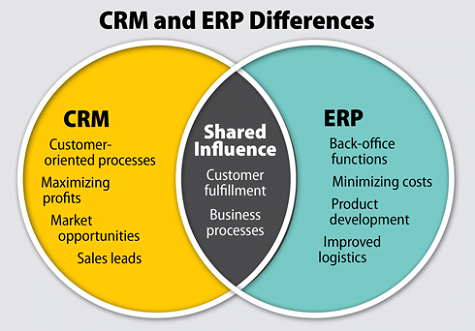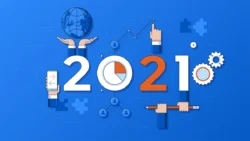You might have a set of questions while considering whether or not to integrate your solutions:
• How can data integration streamline processes?
• Does it help to be customer-centric?
• Is data integration a solution to increase revenue?
• Should I hire a development team to develop my own custom data-integration solution, or is it better to choose a ready-made cloud-based data integration platform?
In order to understand the value integration will bring to you, let’s dive deeper into CRM and ERP systems as stand-alone ones.
Do I Need Both ERP and CRM?
Typically, the two systems are similar in most ways since they have one ultimate goal: increase efficiency, enhance the visibility of all the processes within the company, and boost revenue. Their core functionalities differ greatly; that’s why it’s so important to understand how you can benefit from data integration.
While CRM systems are focused on customer relations and customer experiences, ERP software’s approach is based on the efficiency of the entire business covering production planning, logistics, financial accounting, payrolls, etc. CRM systems record information relating to customer interactions, for example, to nurture leads, create sales projections, or tailor messages, which leads to sales increase and enhanced customer loyalty. With ERP applications, you can see real-time data across departments, cut costs, and reduce overhead.
With all this abovesaid, let’s imagine how the integration of your ERP system and CRM system (for example Salesforce) can be beneficial for your business. Lack of synchronized data between two systems can negatively affect routine operations and create information gaps, which correspondingly leads to an inability to capture the full view of customers. For instance, when having the synced information from both systems in one place, a salesperson can merge all the elements of the sales funnel, including inquiries, opportunities, sales orders, credit limits, invoices. By possessing this type of integrated information, a sales rep can make better predictions regarding product demand or delivery dates, create better marketing campaigns or upsell without excessive data searches and entries in different systems. Consequently, your employees are more productive since they are more focused on business decisions and selling opportunities with consistent real-time data at their fingertips.
What Will I Get When Integrating CRM with ERP System?
The core thing when speaking about data is quality. To obtain qualitative data, it has to be up-to-date and consistent; thus, there should be no manual data entry because it is prone to errors. So what benefits your business will get once two systems are integrated?
1. Increased Sales Efficiency
Having access to all the critical information with the touch of a button increases the chances of salespeople to be more customer-centric and be concentrated on selling rather than being distracted by data search or tedious data entry.
2. Quality
Now your employees can create more robust reports without worrying about data origin.
3. Collaboration
Data integration ensures high efficiency and collaboration among the departments as they have a 360-degree overview of customers. Your business will gain more lucrative opportunities when synchronizing data from different touchpoints that will boost employees’ productiveness and, in turn, improve chances to close more deals.
4. Growth
What is needed for your business growth? The answer is effective solutions that can reinforce your internal operations, facilitate your data, and deliver high service to your customers. Having a massive amount of data within your business environment requires cutting-edge technology to streamline data pipeline development by integrated solutions.
Why Should I Integrate Salesforce and Microsoft Dynamics Through an Integration Platform?
So you decided to connect data from all sources and to have access to all critical information in one centralized space. Now you need a solution that is simple, fast, secure, and flexible. Let’s take a closer look at each specific feature the data integration platforms offer to your business.
Simplicity
Innovative cloud-based software products such as RapidiOnline allow you to quickly and easily integrate Salesforce and Microsoft Dynamics with pre-defined configurations and templates. Installation is easy and does not need any programming or creation of additional reference fields. Add-on solutions and customizations allow utilization of Microsoft Dynamics into Salesforce in the most comprehensive way.
Flexibility
Generally, data integration tools are versatile, enabling either big ventures with complex systems or small businesses to leverage these capabilities. Flexible setup and configuration of data integration tools allow enterprises to customize frameworks in a way that suits them best.
Accessibility
A centralized database means optimized work without the need to spend hours looking for specific pieces of information in various systems. Instant access to real-time data will minimize overhead and provide high performance of employees in the company.







